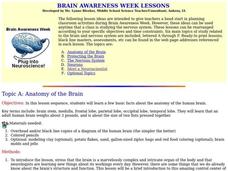Curated OER
"How Do You Measure Up?"
Fourth graders explore basic measurements by analyzing their own bodies. In this human anatomy instructional activity, 4th graders identify the units used to measure a human body such as centimeters, inches, ounces and pounds. Students...
Curated OER
What's For Lunch? (Digestive System)
Students identify components of the digestive system and explain functions. They create and label a diagram of the digestive system. They watch the video "Passage of Food" and perform a proper dissection of a frog. They create a flow map...
Curated OER
The Inside Story- Cells, Organs, and Systems of the Human Body
Fourth graders study the human body from cell level to the inter-relationships of the systems in this unit. Students practice study skills throughout the unit.
Curated OER
Breathing Victory
Students know that participation in sports requires energy. They comprehend that we get energy form the foods that we eat and the air thta we breathe. Converting food and air into usable energy is defined as celluar respiration. Students...
Messenger Education
Exploring Exploring
The reason people first began trading was because of their desires for objects other societies possessed. In the activity, classes discuss why exploration has been a common thread in all societies and where these desires have taken...
Curated OER
Special Senses- Hearing and Equilibrium
For this health worksheet, students examine the human body and make mental connections to the target function highlighted in the sheet.
Nemours KidsHealth
Food Allergies: Grades 6-8
Over two lessons, scholars use articles and discussions to define what a food allergy is and identify the most common food allergens. Small groups prepare a skit showcasing how the body exhibits an allergic reaction. Learners examine...
Curated OER
Case Study Two: Shark Dissection
Young scholars read an article on sharks prior to beginning a dissection lab. As part of the lab, students identify differences between the shark anatomy and human anatomy and hypothesize why those differences exist.
Curated OER
Circulatory System Crossword Puzzle Answers
In this circulatory system worksheet, students are provided with the answers to 13 clues about circulatory system vocabulary.
Curated OER
Digestive System Crossword Puzzle
In this digestive system worksheet, students complete a crossword puzzle with 21 clues pertaining to digestive system vocabulary.
Curated OER
Digestive System Crossword Puzzle Answers
In this digestive system worksheet, students are given the answers to a crossword puzzle with 21 clues pertaining to digestive system vocabulary terms.
Curated OER
The Nervous System
In this nervous system instructional activity, students review the structure and function of the central nervous system. This instructional activity has 1 drawing and 17 fill in the blank statements.
Curated OER
Introduction to the Digestive System
Young scholars describe the digestive system and simulate what happens to food as it passes through. They use an apple, tubing and hydrochloric acid to simulate the digestive process.
Curated OER
Writing an Essay- The Circulatory System
Fifth graders write an essay. In this writing instructional activity, 5th graders research the circulatory system and organize their notes into an outline. Students write an informational essay on the circulatory system.
Curated OER
Signal Transmission in the Nervous System
Students explore signal transmission in the nervous system. They determine the speed of nervous transmission in an integrated nervous system and investigate the differences between signal transmission in a single neuron and in a nervous...
Curated OER
Digestive System
In this digestive system worksheet, students answer a list of true/ false questions. The students answer questions based on their knowledge of each process of the digestive system.
Curated OER
Pathway of Life
First graders explore the circulatory system and its functions. They draw and label the parts of the circulatory system on traced body paper cutouts, and walk on a large chalk outline of a body, following the path of the circulatory system.
Curated OER
Brain Awareness Week
Students explore the brain. In this science lesson, students create a model of the brain and discuss steps taken in order to protect the brain. Students design a container that would protect the brain from injury. Students discuss the...
Curated OER
Neuroscience for Kids
For this neuroscience worksheet, students explore the Neuroscience for Kids website and then complete the questions. Students compare axons and dendrites, the central, peripheral, and autonomic nervous system, and the different lobes of...
Curated OER
Preventing and Treating Disease
In this disease learning exercise, students will review the organs associated with the immune system including their specific functions. This learning exercise has 10 matching, 8 true or false, and 5 short answer questions.
Curated OER
My Five Senses
Students investigate the five senses. In this senses lesson, students explore the nervous system. Students examine how the body receives information through the five senses.
Curated OER
The Mammalian Heart
In this mammalian heart worksheet, students fill in the blank with information about the circulatory system and the process of cardian catheterization.
Curated OER
I Am A Rock, I Am An Island: Describing Landforms and Bodies of Water
Students identify common landforms and bodies of water from descriptions of distinguishing features. In this landforms and bodies of water lesson plan, students describe the features they see in the pictures given to them.
Curated OER
Three Dimensional Art of Vertebrates and Invertebrates
Young scholars, during this twelve week series of lessons, learn basic anatomy through life sketches of human skeletons and shells. They learn fundamentals of line and convey life through sketches learning science through art.

























